Paste Power Ranking: The 10 Best TV Shows on Right Now, from Schitt’s Creek to Run
Illustration by Christine Fernando and Soleil Collins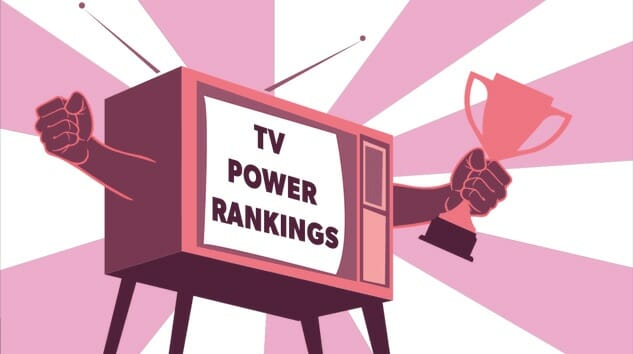
This week, a new streaming service launched (I just typoed “screaming service,” which is more accurate): Quibi. Ah Quibi, you billion-dollar project you. These mobile-only “quick bites” might have been of interest to some, but it ranked lower than bread on a check of Google trending searches. The results cannot be refuted. Quibi: Not better than sliced bread.
A number of other series also bravely launched into this Peak TV landscape this week, including two projects from Phoebe Waller-Bridge collaborators: HBO’s Run and the new season of BBC America’s Killing Eve. We also got a new costume drama, the return of an old favorite, and an SNL Skype call of sorts. Meanwhile, the egregious Tiger King continues to lurk around the edges of our pop culture consciousness …
The rules for the Power Rankings are simple: Any series on TV qualifies, whether it’s a comedy, drama, news program, animated series, variety show or sports event. It can be on a network, basic cable, premium channel, Netflix, Amazon, Hulu, YouTube or whatever you can stream on your smart TV, as long as a new episode was made available the previous week—or, in the case of shows released all at once, it has to have been released within the previous four weeks.
The voting panel is composed of Paste Editors and TV writers with a pretty broad range of tastes. We’re merciless: a bad episode can knock you right off this list. So much good TV is available right now.
Honorable Mention: Dispatches from Elsewhere (AMC), Insecure (HBO), Last Night with John Oliver (HBO), Better Things (FX), Devs (Hulu), Brooklyn 99 (NBC)
10. Belgravia
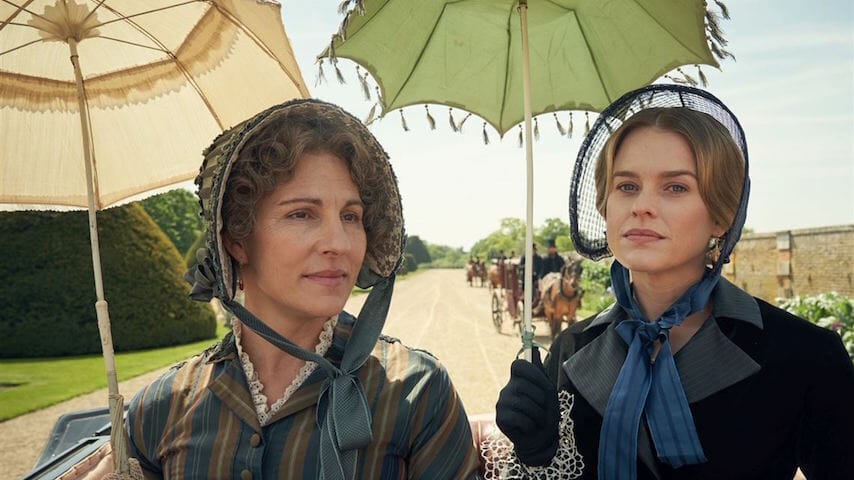
Network: Epix
Last Week’s Ranking: Not Eligible
This Week: So pretty! So soothing! It’s nice to have a good costume drama to watch.
For those who have missed the swirling, upperclass dramas of Downton Abbey, its creator Julian Fellowes has penned another (much shorter) story worth the obsession: Belgravia, whose sleek six episodes provide the TV equivalent of a beach read romp, one that is engaging and ultimately very satisfying. The series focuses on a set of wealthy denizens and the up-and-coming merchant class of this newly planned area of London, beginning on a fateful (true) night of an infamous ball that takes place on the eve of the Battle of Waterloo. The choices made there between two young lovers reverberate throughout the generations, both old and young, creating a web of lies and pain and coverups that continue to define relationships decades later. That’s a purposefully vague description, because the revelations of these connections and twists are what make Belgravia such fun.
Some of the secrets that our socialite lynchpin Anne Trenchard (Tamsin Greig) holds—and chooses to reveal—kickstart the whole affair, which includes bad debts, secret babies, eloping lovers, useless heirs, and clandestine meetings. All of it layers upon itself to lead us to a thrilling final two episodes, where viewers (this one included) will be desperate for good information to spread as rapidly as the bad has, and for misunderstands to be cleared up and away during a chaotic climax. Everything comes down to money, of course—those who have it, those who want it, those who will do anything for more of it.
Belgravia would feel fully at home on PBS Masterpiece, and perhaps one day will end up there. For now, fans will have to look a little further on the cable dial (or consider adding this premium service, which is currently running a 30-day free trial) to unlock its secrets. —Allison Keene
9. Killing Eve
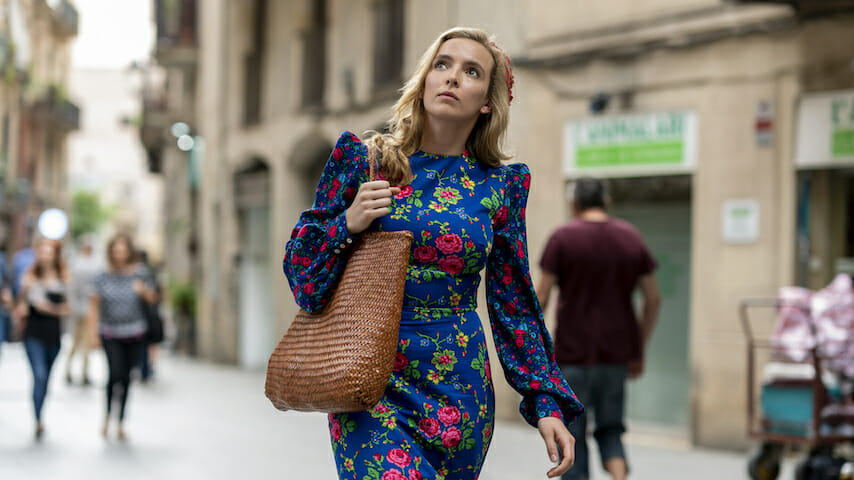
Network: BBC America
Last Week’s Ranking: Not Eligible
This Week: The groundbreaking series returns with a major twist in the first episode.
New lead writer / EP Suzanne Heathcote takes the reins for Killing Eve Season 3, which focuses on the unique relationship between beleaguered agent Eve Polastri (Sandra Oh) and flamboyant assassin Villanelle (Jodie Comer), picking up some time after the latter shot the former to end Season 2. Heathcote makes a decision to keep Eve and Villanelle separated (minus one brief and surprising scene) for most of the first episodes, which works well. There’s more to explore with them apart, although Eve’s story does again suffer somewhat when not closely tied to Villanelle. Of course the sartorially-minded superstar assassin is the more interesting thread to follow, especially as Season 3 seeks to uncover more of her past. But (so far) it doesn’t do the same for Eve, who again often feels secondary to her own story as she faces a personal wilderness working odd hours in the kitchen of a restaurant, drinking too much, and spending her nights with Cup Noodles while Villanelle believes she’s dead. In a way, she is.
In Season 2, we saw Villanelle start things off being knocked off-kilter and struggling to find her way back to the top. Now the same is true of Eve, as the series plays out its narrative seesaw. Where this all leads is uncertain (other than Season 4, for which the show has already been renewed), but so far Killing Eve’s third season remains engrossing, surprising, and strangely funny (like when Villanelle gets an incurable case of hiccups over the prospect of seeing her family again). It’s also casually brutal, something that continues to give the series its edge. Still, there is something fresh about this new exploration of what has become an old dynamic, and the episodes get better and deeper as the season progresses. It may not be as balanced as it was in that first magical outing, and some of the plot points may feel a little recycled, but Killing Eve ultimately remains a devilish delight. —Allison Keene
8. Saturday Night Live at Home
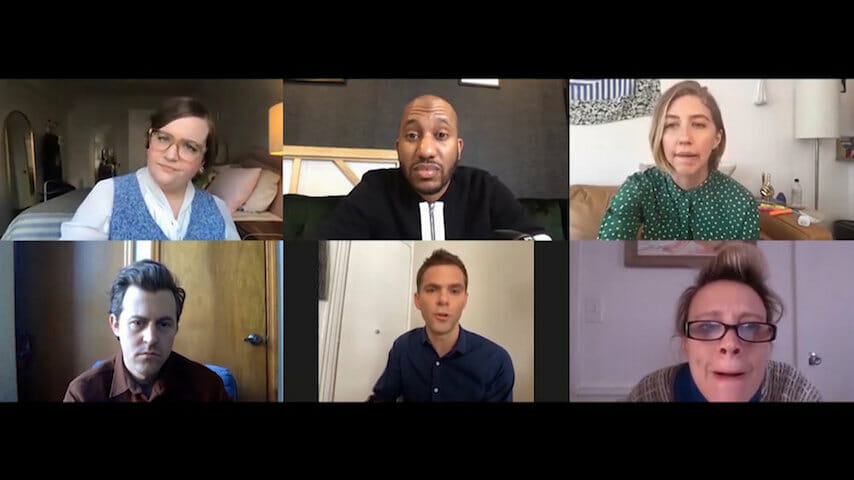
Network: NBC
Last Week’s Ranking: Not Ranked
This Week: SNL: Zoom edition.
Here’s something that hits a little too close to home: during the quarantine episode of Saturday Night Live, we got a glimpse at how life has turned out for Leonardo, Donatello, Michelangelo and Raphael in the animated short “Middle-Aged Mutant Ninja Turtles.” And no, it ain’t pretty.
The cartoon aired during what will go down as one of the most memorable episodes of SNL ever. As per the social distancing and shelter-at-home regulations in place throughout most of the country, the episode was produced entirely using footage shot at each cast member’s homes, with only a few sketches featuring more than one of them. I’m not sure if it was more consistently funny than a typical SNL in its 45th season, but it was such a thorough break from the show’s hidebound formula that it definitely felt fresher. —Garrett Martin
7. Better Call Saul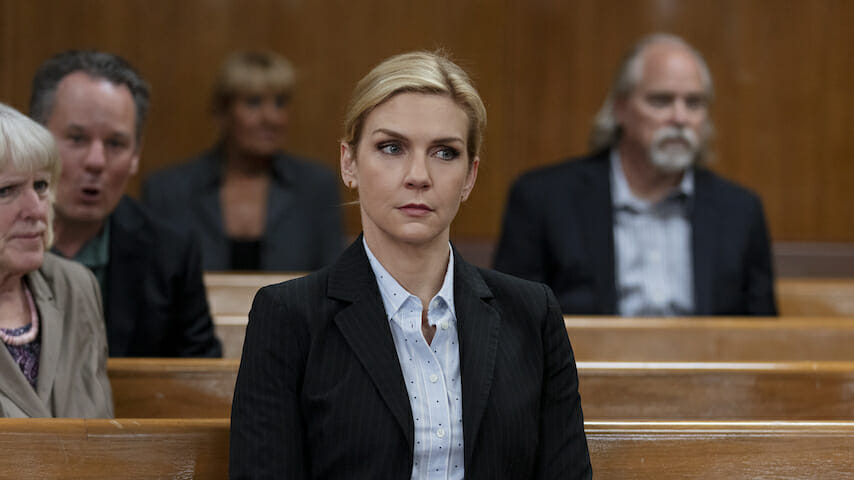
Network: AMC
Last Week’s Ranking: 6
This Week: Jimmy and Mike’s bottle episode in the desert was filled with anxiety.
It was only recently announced that Better Call Saul would be ending with its sixth season, though it wasn’t necessarily shocking news, given that with each passing year it’s been harder for one of TV’s best shows to ignore the future it’s been creeping towards. Season 5 is smart about how it acknowledges that, specifically in regard to increasing the Breaking Bad prequel’s engagement with what came canonically before but narratively after.
The final 13-episode season will mean that Saul will have run for 63 episodes, one more than Breaking Bad. Like everything else about this show, that was a deliberate choice. That said, Season 5 of Saul doesn’t necessarily feel like the beginning of the end. Instead, it’s more like the end of the beginning, given that after the events of the Season 4 finale, Jimmy McGill has now officially embraced the Saul Goodman identity—legally and professionally, at least.
Saul is the first persona we ever saw Bob Odenkirk wear in this universe, but thanks to the four seasons that have come before, we recognize it for the mask that it is. However, Jimmy seems to be getting more comfortable with wearing it, especially when this season pushes him to make some choices that prove reminiscent of his original introduction: In the words of Jesse Pinkman, “You don’t want a criminal lawyer… you want a ‘criminal’ lawyer.”
But Better Call Saul is a show whose fundamental foundation is built on the idea that every action has consequences, seen or unseen. In comparison to The Good Place, a show all about ethical debate, Better Call Saul isn’t searching for answers: The characters might debate ideas of moral relativism, but the sure and steady hand of creators Peter Gould and Vince Gilligan knows what is right and what is wrong—and it is never afraid to reveal what can happen when that line gets crossed. —Liz Shannon Miller
6. Little Fires Everywhere
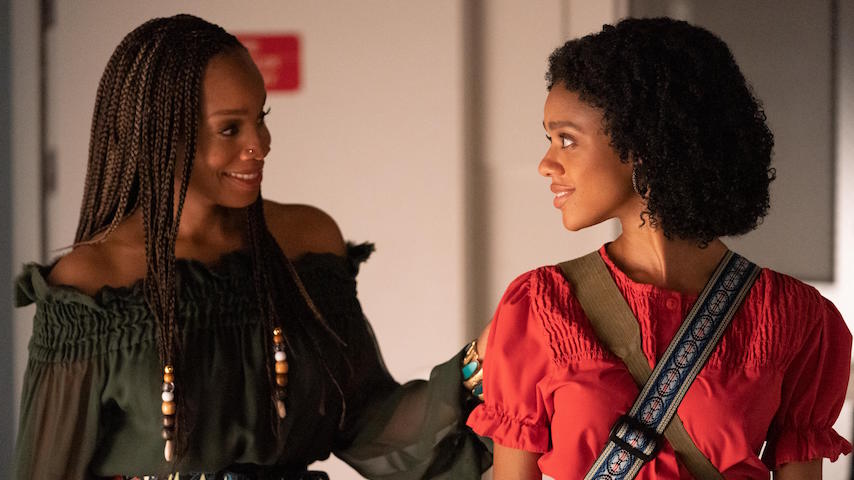
Network: Hulu
Last Week’s Ranking: 5
This Week: A flashback episode gave us important character context and addressed the complexities of nursing!
“You didn’t make good choices. You had good choices! Options that being rich and white and entitled gave you.”
That’s Mia (Kerry Washington) screaming to Elena (Reese Witherspoon) during the emotionally charged fourth episode of the new Hulu series Little Fires Everywhere.
The line sums up the crux of a series that explores the complicated themes of race, wealth, and motherhood with a delicate aplomb. Based on the Celeste Ng’s 2017 novel of the same name, the eight-episode series follows the sequence of events that occur when Mia moves to the storied community of Shaker Heights, Ohio with her teenage daughter Pearl (Lexi Underwood) in 1997.
Elena’s friend Linda (Rosemarie DeWitt) has struggled with infertility for years and has finally adopted a baby with her husband Mark (Geoff Stults). Their lives have been wrecked by miscarriages and still births. Their adopted daughter Mirabelle is the answer to years of prayer and heartache. Meanwhile, Mia’s co-worker Bebe (Huang Lu) decides to fight for custody of the baby she abandoned. The mother-focused stories continue, and eventually come to a boil: these proverbial “little fires everywhere” become harder and harder to extinguish as the series progresses.
The series is set in the 1990s but its themes, particularly those surrounding what defines motherhood, are timeless. The conversation around race and privilege are perhaps even more relevant today than the era in which the show is set.
Washington is fantastic as Mia. Her hard, angry exterior barely conceals her vulnerability. She’s a fiercely protective mother who may not always make the best choices but always wants what is right. Witherspoon has perfected the entitled character who is blind to her own entitlement, living a life that is so controlled and carefully cultivated that she may have even lost sight of what she truly wants in life. Together, these elements ignite to form a show well worth watching.—Amy Amatangelo
5. One Day at a Time
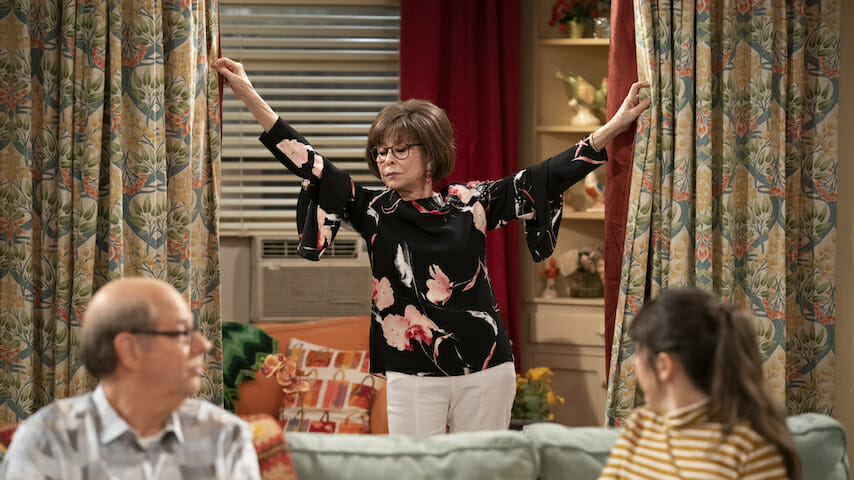
Network: Pop TV
Last Week’s Ranking: Honorable Mention
This Week: The show continues to break down the generational difference about sexuality with respect and humor.
One Day at a Time, which moves to Pop TV after being unceremoniously cancelled by Netflix after three seasons, didn’t just survive the move from a streaming platform to a more traditional network, it is thriving. The show is as sharp, witty, poignant, and hilarious as ever. Truly the only noticeable difference is that Alex (Marcel Ruiz) is a lot taller. The show gets its dig at its former home out of the way early (“It’s like there’s nothing good on Netflix anymore,” Alex laments) so it can get back to doing what it does best. The minute Lydia throws open her bedroom curtains with her trademark dramatic flair, you know everything is going to be okay.
The show is actually a much better fit on Pop TV, the home of Schitt’s Creek. Its comedic beats are more suitable for commercial interruption. And there’s so much to love about One Day at a Time: the way it both respects and finds the humor in the family’s Catholic faith, the ongoing repercussions of Penelope’s time in Afghanistan (she’s still in group therapy with McKenzie Phillips as the group leader), the loving way it admires a close-knit family (“There is no such thing as privacy from your mother!”) celebrating the family’s Cuban heritage, and honoring that a loving, devoted and platonic friendship can exist between Penelope and Schneider. The show is at once a throwback and cutting edge. The cast is all so strong. They hit the comedic notes effortlessly and with aplomb.
How lucky we all are to have a show this beautiful, funny and uplifting during such a difficult time. Dale One Day at a Time! Dale! — Amy Amatangelo
4. Run

Network: HBO
Last Week’s Ranking: Not Eligible
This Week: Big sexual train tension energy.
Who hasn’t, at some point, fantasized about just running off and leaving it all behind? No time to pack, no time to think, just go. That is, essentially, the premise of HBO’s new half-hour series Run. Merritt Wever and Domhnall Gleeson star as a pair of college exes (Ruby and Billy) who, 17 years later, are making good on a promise that if one texted “RUN” to the other and they responded in kind, they would do just that. Their plan—involving planes, trains, and automobiles—thus ensues over the course of a week, where the duo then decide to stay together or never see each other again.
It sounds glamorous, but the reality is anything but. Slowly, we learn the truth about Billy and Ruby’s lives outside of this adventure, and where they are now (at the age of mid-30s-ish). Most of the early episodes take place on a cross-country Amtrak train, a wonderful cramped space that director Kate Dennis incorporates into the beats of the story itself. There are moments of fantasy or excitement, but mostly the interactions (between two people who have been apart for almost two decades) are believably awkward. There’s a lot of emotional honesty hidden between their conversations though, as they flirt with the natural rapport of people who were once in love yet hold back so many truths about themselves.
When Run is at its most authentic, it truly shines as a character study, honestly searching for how something so outlandish would really work. In those moments, it never shies away from the truth that we can’t run from ourselves, and Wever and Gleeson plays that sadness with aplomb. But again, once things start spiraling so out of control that it reaches territory that can never be undone in these characters’ lives, it has the potential to lose some of that authenticity as it moves towards bigger and bigger moments (it’s the same problem Killing Eve has had as it’s continued). In Wever and Gleeson we trust, though, as we watch two people do everything we, at the moment, cannot: Get on trains, share small spaces, and just run away from it all. —Allison Keene
3. Outlander
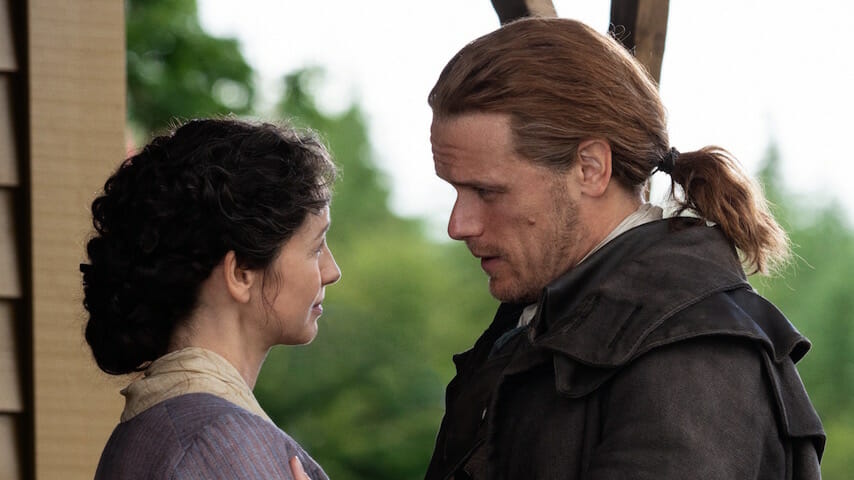
Network: Starz
Last Week’s Ranking: Not Eligible
This Week: An emotional, exception hour that gave just enough closure while providing new cliffhangers.
As our own Keri Lumm said of Outlander’s new season, it feels like a warm hug of familiarity. But after kicking off with the joy of a wedding, Outlander soon movies into worthy and complicated considerations of living in the past while having modern knowledge—particularly of medicine that could help your family and community. As Claire (Caitriona Balfe) expands her medical practice, Jamie (Sam Heughan) must wrestle with promises he’s made to the Crown in order to keep his American land where his family has made a homestead. The America Revolution inches closer, with the Frasers at the center of it all, of course. But Outlander is at its best when its focusing on the personal stories (including one surprisingly horrific story detour that may also be one of the show’s most outstanding) within these larger historical contexts, most especially the partnership and enduring romance between Jamie and Claire, which remains TV’s most loving and aspirational. —Allison Keene
2. Schitt’s Creek
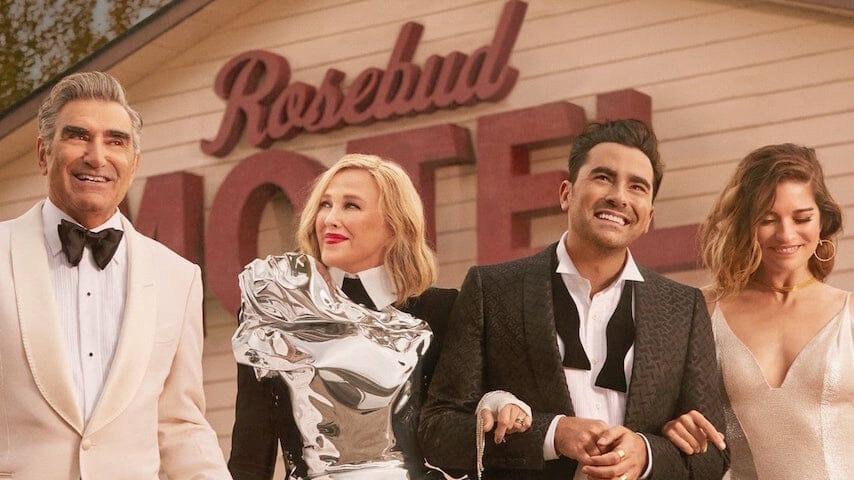
Network: Pop TV
Last Week’s Ranking: Not Ranked
This Week: One of TV’s sweetest, funniest comedies said goodbye with its series finale.
“After an award-worthy trilogy of decades together,” Moira Rose (Catherine O’Hara) tells her daughter early in the final season of the exemplary Schitt’s Creek, “your father and I still astonish each other.” Of the many things Pop TV’s deeply empathetic comedy gets right—and make no mistake, Schitt’s Creek gets pretty much everything right—the rarest is that exact quality: astonishment. The denizens of this far-from-bustling town quietly astonish each other with great frequency; like most people, they are almost always more than they seem.
What’s most, yes, astonishing about that fact is that in its return, Dan Levy’s series remains as funny—sometimes acidly, sometimes daffily, never cheaply—as ever. It’s tempting to fold Schitt’s Creek in with excellent shows like Parks and Recreation or the rebooted One Day at a Time, warm-hearted stories about good people taking care of each other. Schitt’s is, at its heart, a story about care, and it is every bit as good as those two series. But it’s tender rather than warm, a gentle thing, as a fragile yet resilient as two beautiful wings pushing mightily to emerge from a chrysalis. Four wounded people were forced to set up camp in Schitt’s Creek, though perhaps none of them truly acknowledged their hurts. To say life in a small town healed them would be to turn Levy’s marvelous series into something much smaller and more shallow; the Rose’s found, stabilized, and even healed their wounds individually, as a family, and with the help of the people who crossed their paths. Of course, those people had wounds, too, which is something—sometimes the only thing—they all shared. —Allison Shoemaker
1. The Good Fight
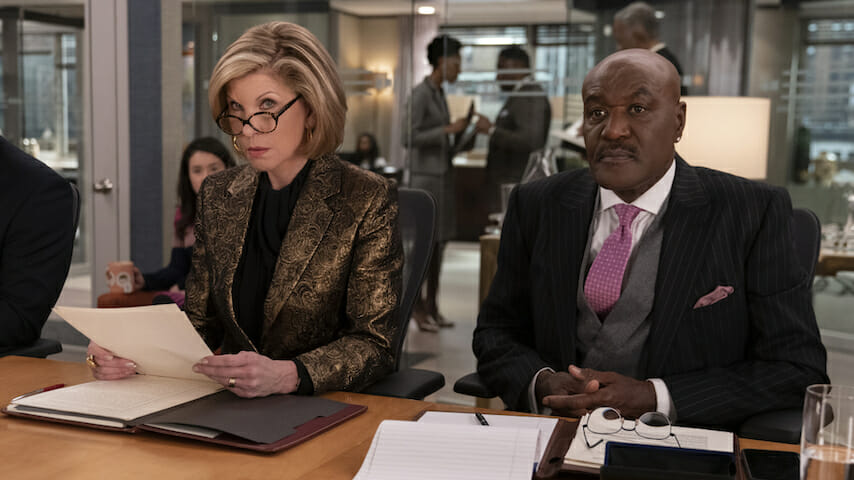
Network: CBS All Access
Last Week’s Ranking: Not Eligible
This Week: A surprising and thoughtful alt-universe exploration made for a heck of a premiere episode.
Diane (Christine Baranski) and her fabulous statement necklaces enter The Twilight Zone in the Season 4 premiere of the stellar CBS All Access drama The Good Fight. With her perfectly coiffed hair and outfits to-die-for, Diane, in a warped recreation of the series pilot, wakes up to a world where Hillary Clinton won in 2016. Great, right? All our problems are solved. Not so fast! In a trippy, mind-bending hour, the show explores what might have been and the unintended consequences of a Hillary victory. Much like many of us are finding the silver lining in the current quarantine (More time with family! We can all make bread now!), the premiere theorizes that maybe, just maybe, something good has come out of the Trump presidency. The Good Fight continues to provide the group therapy we all need to deal with the current administration; it’s the fever dream we’ve been waiting for.—Amy Amatangelo
For all the latest TV news, reviews, lists and features, follow @Paste_TV.







































